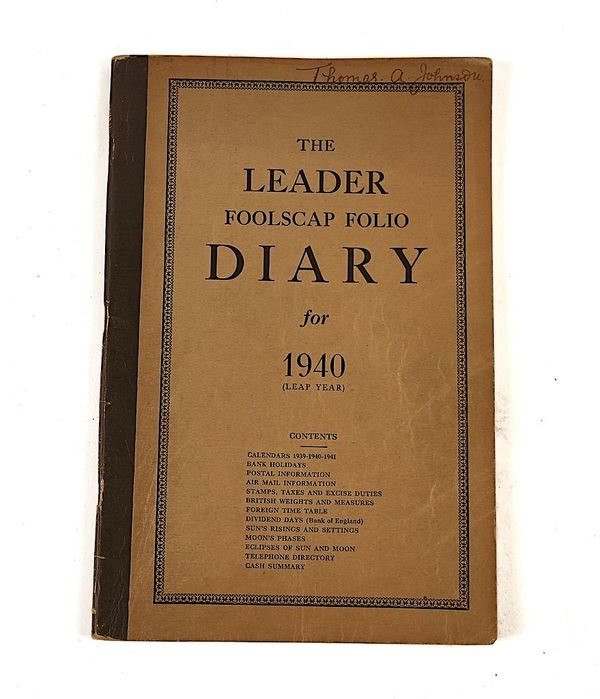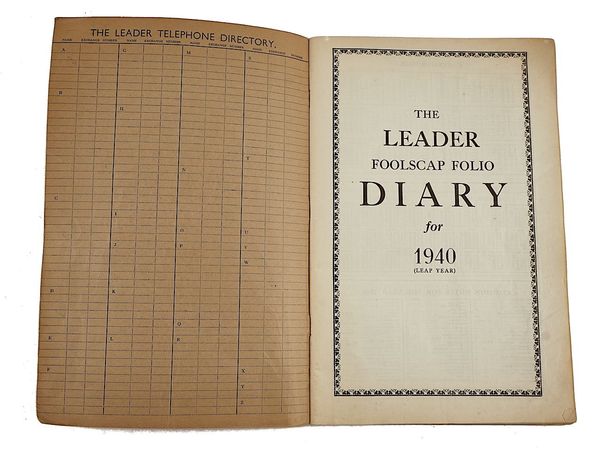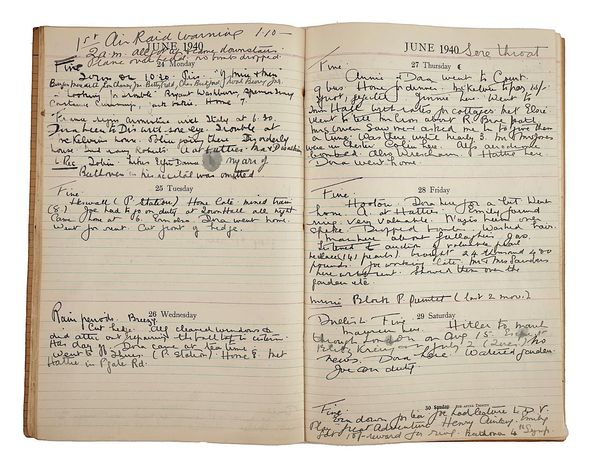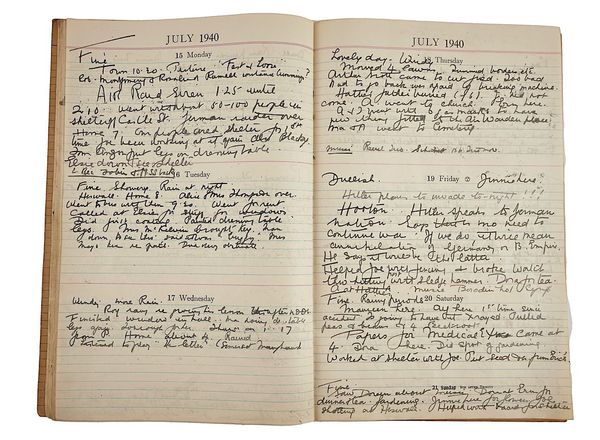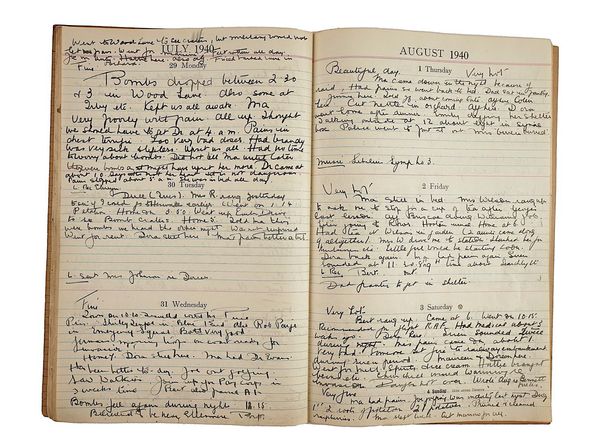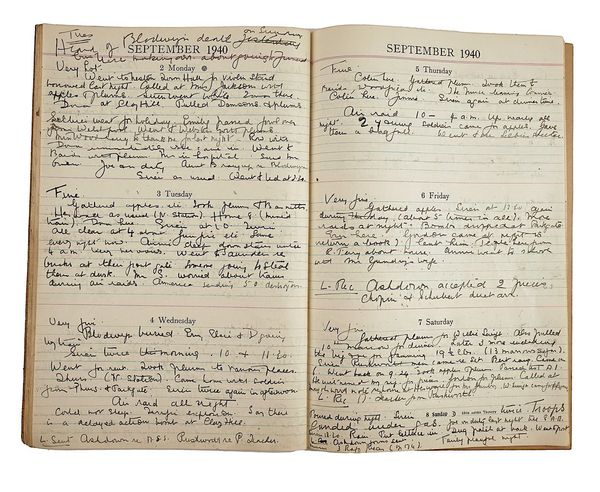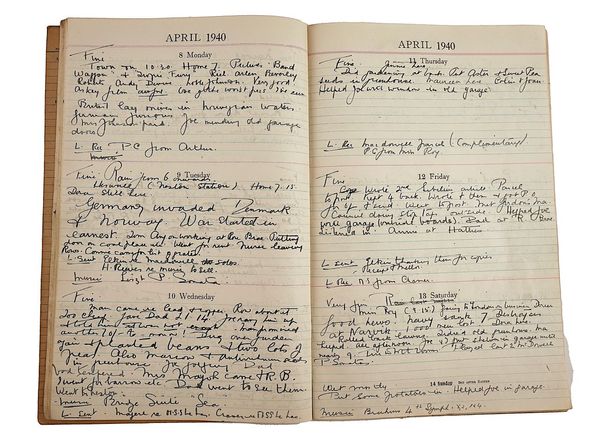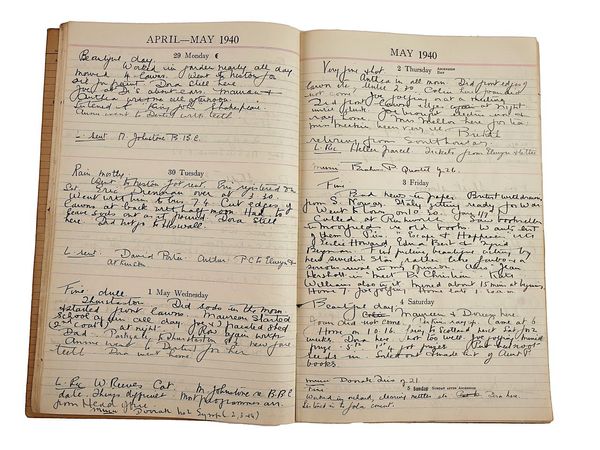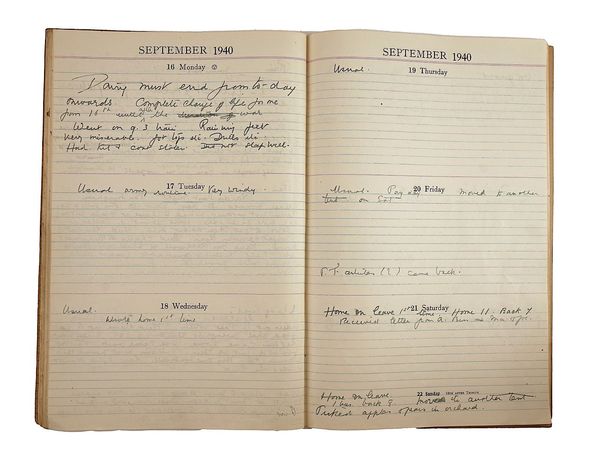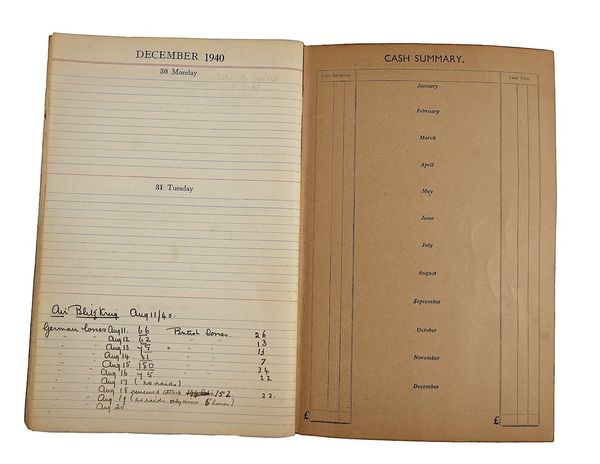"THE PHONEY-WAR", DUNKIRK, THE BATTLE OF BRITAIN AND THE BLITZ - "The Leader Foolscap Folio Diary for 1940". Manuscript diary on c. 50 leaves kept by Thomas A. Johnson.
| Estimate: | £200 - £300 |
| Hammer price: | £20 |
"THE PHONEY WAR", DUNKIRK, THE BATTLE OF BRITAIN AND THE BLITZ - "The Leader Foolscap Folio Diary for 1940" [title printed on upper wrapper]. Folio (320 x 210mm). Manuscript diary on c. 50 leaves ruled in red and blue, with extensive daily entries kept from 1st January to 16th September 1940, after which, following the enlistment of the diarist, they become sparser or non-existent. Provenance: Thomas A. Johnson (contemporary signature, in the same hand as the diary, on the upper wrapper - see note). A FASCINATING, MOVING AND OCCASIONALLY UNSETTLING DAY-BY-DAY ACCOUNT OF LIFE IN WARTIME PROVINCIAL ENGLAND in which world events are thrown into poignant relief by mundane descriptions of domestic life, including a great deal of gardening, listening to concerts and plays on The Home Service and numerous visits to "the Pictures" ("Askey film awful"). The opening of the diary is remarkable for its apparent lack of interest in the war - a testament to its initial "phoney" status - which it does not allude to until the 13th March when the entry abruptly states, "Finns agreed to Russia's terms." From there on, the international situation plays an increasingly prominent and anguished part in the entries as it starts to intrude upon the everyday life and emotions of the writer and his family: on 18th March, for instance, "Hitler met Mussolini"; on 8th April, "British lay mines in Norwegian waters"; on 9th April (in a much larger hand than the rest of the entry), "Germany invaded Denmark and Norway. War started in earnest"; on 13th April, "Navy sank 7 Destroyers at Narvik. 1000 men lost. Dora here. Rolled back lawns. Tidied old greenhouse"; on 22nd April, "Planes droning all night"; on 6th May, "3 Destroyers gone west"; on 16th May, "War waging fiercely. The greatest Battle ever known"; on 19th May, "Put sweet peas out. Mowed back lawns. Churchill spoke 1st time as Prime Minister"; on 21st May, "Germans advancing rapidly towards English Channel. French traitors fail to blow up bridge"; on 29th May, "B. E. F. withdrawing to coast due to Belgian surrender"; on 13th June, "Terrible war news. Afraid France is done for"; on 14th June, "Germans enter Paris. Fine day, to Hooton. Home 5. Did gardening"; on 17th June, "France stops fighting. Terrible news. Britain left alone to fight"; on 21st June, "Hitler meets French in forest to discuss peace terms. Felt very miserable"; on 28th June, "Nazis been over Speke. Dropped bombs. Washed hair"; on 29th June: "Hitler to march through London on Aug. 15th"; on 19th July, "Hitler plans to invade to-night!!!"; on 22nd July, "3rd air raid warning 1-45 - 2am. All got up and went to shelter. I had to get out for fear of suffocating. Ma had brandy"; on 27th July, "Poles starving. 2000 dying each day. [?]Em gathering Dora's apples"; on 13th September, "Felt hellishly miserable. Cannot stand many more goodbyes! Germans ready for invasion. Troops massed"; on 16th September (having enlisted), "Diary must end from to-day onwards. Complete change of life for me from 16th until after the war. Went on [?]9.30 train. Raining. Felt very miserable. Drills etc. Had kit and coat stolen. Did not sleep well." On the verso of the final leaf, under the heading "Air Blitz Kreig[sic] Aug 11/40", is listed a tally of aircraft losses on either side from 11th August to 20th August, 1940, in which German losses are a great deal higher than British ones. The keeper of these diaries is almost certainly the composer, arranger and music teacher Thomas Arnold Johnson (1908-89) who would have been about 32 at the time of writing. The attribution can be made with some confidence since many of the entries mention place names in the locale of Neston, the Wirral, where he lived his whole life, and also describe composing, arranging and teaching music, and list, on an almost daily basis, every major piece of music he listened to, in the evenings, on the Home Service. It is not known in which capacity or rank he served in the war but we do know that, happily, he survived it and went on to a long and successful career in music.
